外研版(2019)必修第一册Unit 2 Exploring English Understanding ideas课件 (共34张,内嵌音频)
文档属性
| 名称 | 外研版(2019)必修第一册Unit 2 Exploring English Understanding ideas课件 (共34张,内嵌音频) | 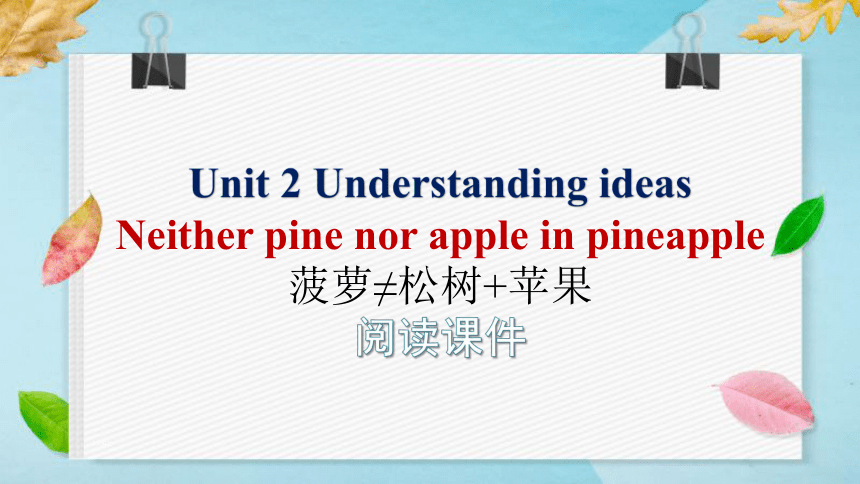 | |
| 格式 | pptx | ||
| 文件大小 | 9.9MB | ||
| 资源类型 | 教案 | ||
| 版本资源 | 外研版(2019) | ||
| 科目 | 英语 | ||
| 更新时间 | 2024-10-10 16:46:18 | ||
图片预览

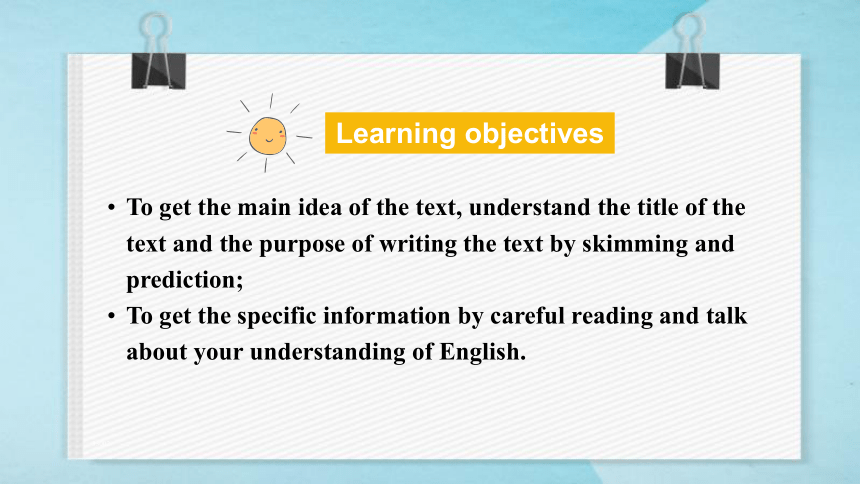

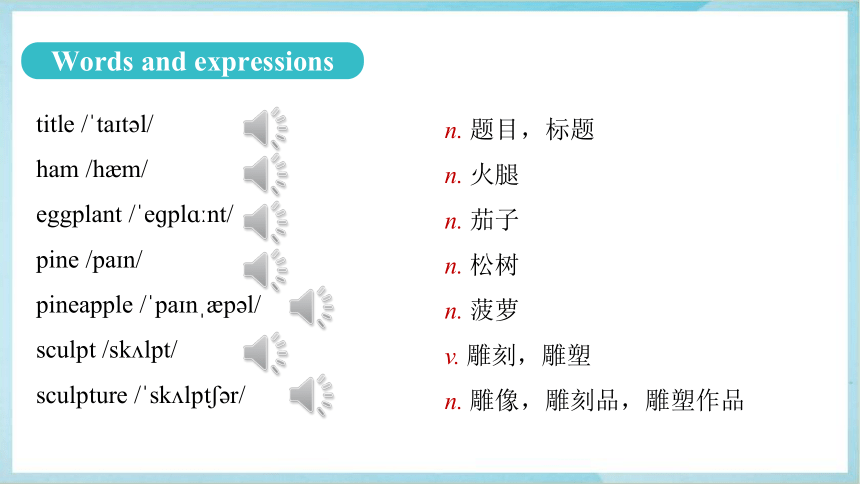
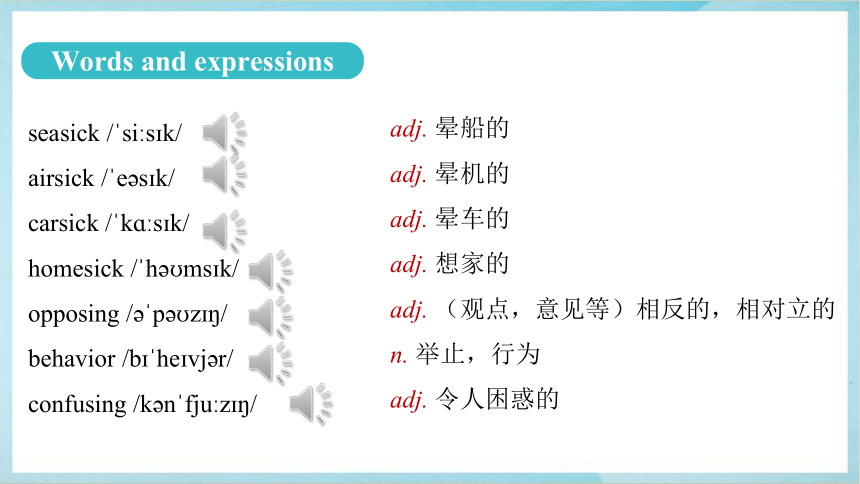
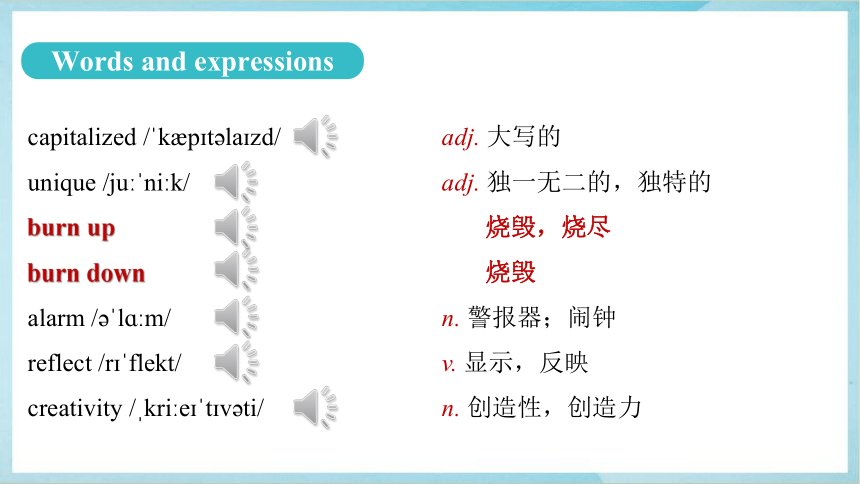
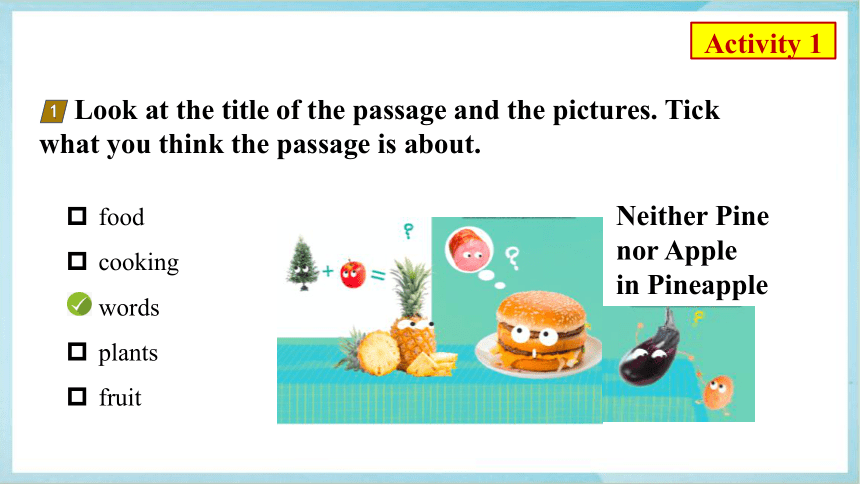
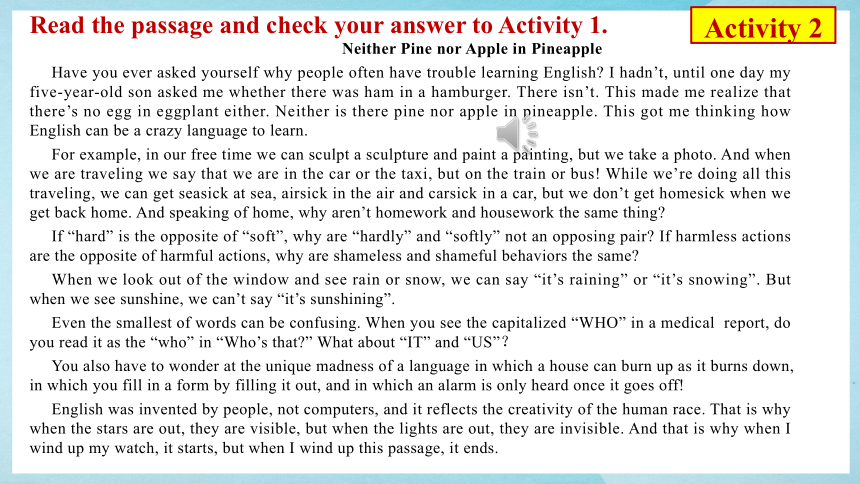
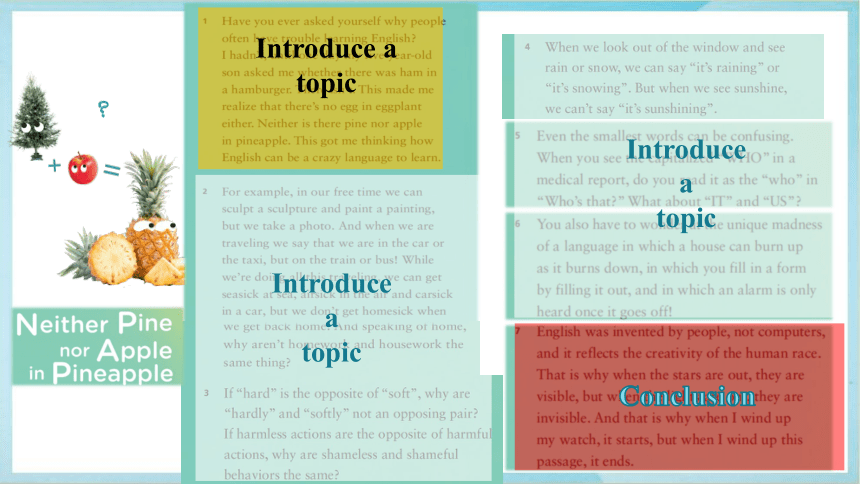

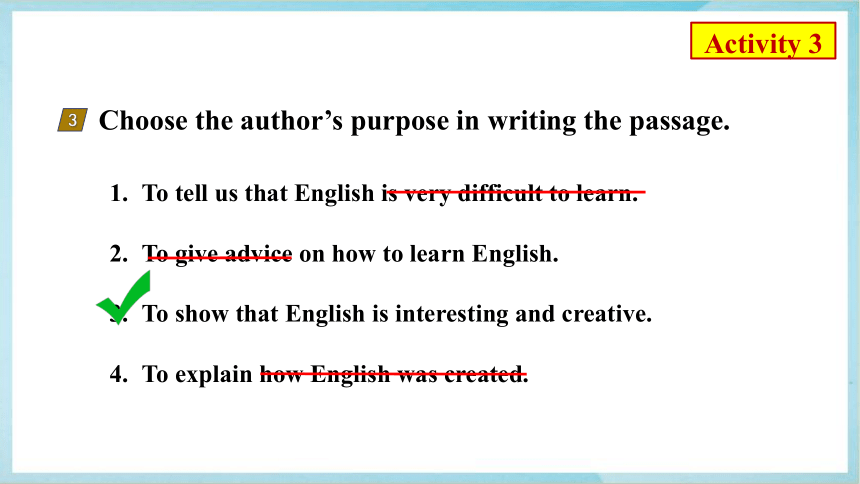
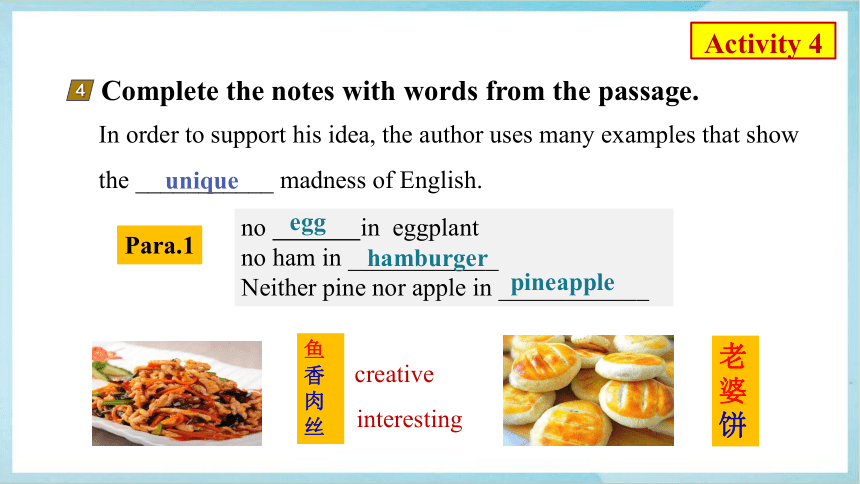
文档简介
(共34张PPT)
Unit 2 Understanding ideas
Neither pine nor apple in pineapple
菠萝≠松树+苹果
阅读课件
To get the main idea of the text, understand the title of the text and the purpose of writing the text by skimming and prediction;
To get the specific information by careful reading and talk about your understanding of English.
Learning objectives
Look through Page 18~21, find the new words and phrases, read them loudly and then read together.
title / ta t l/
ham /h m/
eggplant / eɡplɑ nt/
pine /pa n/
pineapple / pa n p l/
sculpt /sk lpt/
sculpture / sk lpt r/
n. 题目,标题
n. 火腿
n. 茄子
n. 松树
n. 菠萝
v. 雕刻,雕塑
n. 雕像,雕刻品,雕塑作品
Words and expressions
seasick / si s k/
airsick / e s k/
carsick / kɑ s k/
homesick / h ms k/
opposing / p z /
behavior /b he vj r/
confusing /k n fju z /
adj. 晕船的
adj. 晕机的
adj. 晕车的
adj. 想家的
adj. (观点,意见等)相反的,相对立的
n. 举止,行为
adj. 令人困惑的
Words and expressions
capitalized / k p t la zd/
unique /ju ni k/
burn up
burn down
alarm / lɑ m/
reflect /r flekt/
creativity / kri e t v ti/
adj. 大写的
adj. 独一无二的,独特的
烧毁,烧尽
烧毁
n. 警报器;闹钟
v. 显示,反映
n. 创造性,创造力
Words and expressions
Look at the title of the passage and the pictures. Tick what you think the passage is about.
food
cooking
words
plants
fruit
Neither Pine
nor Apple
in Pineapple
1
Activity 1
Neither Pine nor Apple in Pineapple
Have you ever asked yourself why people often have trouble learning English I hadn’t, until one day my five-year-old son asked me whether there was ham in a hamburger. There isn’t. This made me realize that there’s no egg in eggplant either. Neither is there pine nor apple in pineapple. This got me thinking how English can be a crazy language to learn.
For example, in our free time we can sculpt a sculpture and paint a painting, but we take a photo. And when we are traveling we say that we are in the car or the taxi, but on the train or bus! While we’re doing all this traveling, we can get seasick at sea, airsick in the air and carsick in a car, but we don’t get homesick when we get back home. And speaking of home, why aren’t homework and housework the same thing
If “hard” is the opposite of “soft”, why are “hardly” and “softly” not an opposing pair If harmless actions are the opposite of harmful actions, why are shameless and shameful behaviors the same
When we look out of the window and see rain or snow, we can say “it’s raining” or “it’s snowing”. But when we see sunshine, we can’t say “it’s sunshining”.
Even the smallest of words can be confusing. When you see the capitalized “WHO” in a medical report, do you read it as the “who” in “Who’s that ” What about “IT” and “US”?
You also have to wonder at the unique madness of a language in which a house can burn up as it burns down, in which you fill in a form by filling it out, and in which an alarm is only heard once it goes off!
English was invented by people, not computers, and it reflects the creativity of the human race. That is why when the stars are out, they are visible, but when the lights are out, they are invisible. And that is why when I wind up my watch, it starts, but when I wind up this passage, it ends.
Read the passage and check your answer to Activity 1.
Activity 2
Introduce a
topic
Introduce
a
topic
Introduce
a
topic
Conclusion
Read the passage and check your answer to Activity 1
2
This passage is about words, it gives us the origin of the words and how people invented them, which helps us have a better understnding of the words and their meanings.
Activity 2
3
Choose the author’s purpose in writing the passage.
To tell us that English is very difficult to learn.
To give advice on how to learn English.
To show that English is interesting and creative.
To explain how English was created.
Activity 3
Para.1
no in eggplant
no ham in ____________
Neither pine nor apple in ____________
老婆饼
鱼香肉丝
egg
hamburger
pineapple
creative
interesting
Complete the notes with words from the passage.
In order to support his idea, the author uses many examples that show the ___________ madness of English.
unique
4
Activity 4
Para.2
sculpt a .
paint a .
But .
the car / taxi
the train / bus
sick at sea
sick in the air
sick in a car
But sick at home
sculpture
painting
take a photo
(derived from the verbs)
in
on
(use different prepositions)
seasick
airsick
carsick
homesick
(the same way of expression but different meanings)
Complete the notes with words from the passage.
4
Activity 4
Para.3
“Hard” is the opposite of “ ”
“Hardly” and “softly” are not an pair
“ ” is the opposite of “harmful”
Shameful and shameless _____________ are the same
soft
opposing
Harmless
(the same prefixes but different meanings)
behaviors
4
Complete the notes with words from the passage.
Activity 4
Para.4
When we see rain or snow, we can say
“ ” or “ ”
But when we see we can’t say “ ”.
it’s raining
it’s snowing
sunshine
it’s sunshining
The sun is shining.
(Some nouns can be used as verbs, some can’t)
Complete the notes with words from the passage.
4
Activity 4
Para.7
Stars are out - They are .
Lights are out - They are .
I wind up my watch - It .
I wind up the passage - It .
visible
invisible
starts
ends
(the same words but different meanings)
Para.6
burn up = burn .
fill in a form = a form
down
fill out
(some set phrases have the same meaning but are used with the opposite adverbs or prepositions)
The reason is that English was invented by people, and it ___________ the creativity of the human race.
reflects
Complete the notes with words from the passage.
4
Activity 4
In order to support his idea, the author uses many examples that show the 1______ madness of English.
The reason is that English was invented by people, and it 13_______ the creativity of the human race.
· no egg in eggplant
· no ham in
2____________
· neither pine nor
apple in
3__________
· sculpt a
sculpture
· paint a(n)
4________
· BUT take
a photo
· seasick → sick at sea
· 5_______ → sick in the
air
· 6_______→sick in a car
· BUT 7__________ →
sick at home
· “Hard” is the
opposite of “soft”.
· “Hardly” and
“softly” are not
a(n) 8_________
pair.
· “Harmless” is the
opposite of “harmful”.
· Shameful and
shameless 9________
are the same.
· burn up →
burn down
· fill in a form →
10_______ a
form
· Stars are out. →
They are visible.
· Lights are out.
→ They are
11________.
· I wind up my
watch. → It starts.
· I wind up the
passage. →
It 12_______.
unique
hamburger
pineapple
painting
airsick
carsick
homesick
opposing
behaviors
fill out
invisible
ends
reflects
Fill in the blanks and try to retell the passage Neither Pine nor Apple in Pineapple.
P21 4
Activity 4
introduction
examples
conclusion
Para. 1 English can be a crazy language to learn
mind map
Style:
argumentation
议论文
选题背景
您的内容打在这里,或者通过复制您的文本后,在此框中选择粘贴,并选择只保留文字。您的内容打在这里,或者通过复制您的文本后,在此框中选择粘贴,并选择只保留文字。
Neither pine nor apple in pineapple
Part 1 (1):
The author’s opinion
English can be a crazy language to learn.
Part 2 (2-6):
Supportive examples
We can’t always understand a compound word by adding the meanings of the words it is made up of!
The same rule doesn’t always apply to everything!
The same words and phrases may have different meanings in different contexts.
Different words or phrases may have the same meaning!
Part 3 (7):
Conclusion
The invention of English reflects the creativity of human race.
Mind map
Can you find similar situation in Chinese
Ma po
wife
fish
lion
Read the following information and answer the questions.
5
The word “pineapple” developed from the Spanish word “pina”, which means pine cone. When it came to England, “ apple” was added to show it is a kind of fruit.
—————————————————————————————————
The origin of “hamburger” was a hard beef steak called “ Hamburg steak” , eaten without bread. Later, people reinvented it and called it “hamburger”.
—————————————————————————————————
Eggplants used to be smaller and yellow or white. They looked a bit like eggs, which led to the name “eggplant”
Activity 5
pine cone
pineapple
1. The word “pineapple” developed from the Spanish word “pina”, which means pine cone. When it came to England, “apple” was added to show it is a kind of fruit.
Activity 5
Hamburg steak
hamburger
2. The origin of “hamburger” was a hard beef steak called “Hamburg steak”, eaten without bread. Later, people reinvented it and called it “hamburger”.
Activity 5
3. Eggplants used to be smaller and yellow or white. They looked a bit like eggs, which led to the name “eggplant”.
Activity 5
The origin of
some words
English is interesting and creative!
The vigor of
a language
Activity 5
1.How did pineapples, hamburgers and eggplants get their names
The word “pineapple” developed from the Spanish word “pina”, which means pine cone when it came to England, “ apple” was added to show it is a kind of fruit.
The origin of “hamburger” was a hard beef steak called “ Hamburg steak” , eaten without bread. Later, people reinvented it and called it “hamburger”.
Eggplants used to be smaller and yellow or white. They looked a bit like eggs, which led to the name “eggplant”.
Activity 5
1.How did pineapples, hamburgers and eggplants get their names
2.Does the information give you a better understanding of the passage Give your reasons.
The name of “pineapple” developed from the Spanish word “pina”, with “apple” added to show it’s a kind of fruit; the name of hamburger came from the idea of “Hamburg steak”, and later people reinvented it and called it “hamburger”; eggplants got the name because they used to look like eggs.
Yes. The information above gives me the origin of the words and how people invented them, which helps me have a better understanding of the words and their meanings.
Activity 5
Group Discussion
Do you think English is a crazy language to learn Why Can you give more examples
In my opinion, English is crazily interesting. For example, the sentence “Never trouble troubles till trouble troubles you” includes two parts of speech of the word “ trouble”. The first one and the forth one are verbs; and the second and third one are nouns. Usually, it’s very important to figure out the part of speech of each word so that we can better memorize it.
Activity 6
1.Do you agree with the author’s opinion about the English language Give your reasons.
Yes. I agree with the author’s. For example, the sentence “Never trouble troubles till trouble troubles you” includes two parts of speech of the word “ trouble”. The first one and the forth one are verbs; and the second and third one are nouns. Usually, it’s very important to figure out the part of speech of each word so that we can better memorize it.
Think Share
Activity 6
2. What do you find most challenging about learning English How do you deal with this
It is the craziness, complexity and creativity that makes a language unique, interesting and enjoyable to learn.
Take a positive attitude, be curious, patient and open-minded and keep on exploring the reasons behind a language.
Activity 6
Think Share
We can graspe the main words or phrases by doing the following exercises!
Activity 7
Consolidation
One day my five-year-old son asked me whether there was ham in a hamburger. There isn't. This made me realize that there's no egg in eggplant either. Neither is there pine nor apple in _________. This got me thinking how English can be a ______ language to learn.
For example, while we're traveling, we can get seasick at sea, _______ in the air and carsick in a car, but we don't get _________ when we get back home. And speaking of home, why aren't homework and housework the same thing If “hard” is the opposite of “soft”, why are “hardly” and “______” not an opposing pair If harmless actions are the ________ of harmful actions, why are shameless and shameful behaviors the same
Complete the summary using the information in the passage.
pineapple
crazy
airsick
homesick
softly
opposite
When we look out of the window and see rain or snow, we can say “it's raining” or “it's snowing”. But when we see sunshine,
we can't say “it's __________”.
Even the smallest words can be _________. When you see the capitalized “WHO” in a medical report, do you read it as the “who” in “Who's that ” What about “IT” and “US”
You also have to wonder at the ______ madness of a language in which a house can burn up as it burns down.
English was invented by people, not computers and it reflects the _________ of the human race. That is why when the stars are out, they are visible, but when the lights are out, they are invisible. And that is why when I wind up my watch, it starts, but when I wind up this passage, it ends.
sunshining
confusing
unique
creativity
Review what you have learnt in this class;
Write a passage about similar examples in Chinese, following the structure of the passage you have learnt.
Homework
Unit 2 Understanding ideas
Neither pine nor apple in pineapple
菠萝≠松树+苹果
阅读课件
To get the main idea of the text, understand the title of the text and the purpose of writing the text by skimming and prediction;
To get the specific information by careful reading and talk about your understanding of English.
Learning objectives
Look through Page 18~21, find the new words and phrases, read them loudly and then read together.
title / ta t l/
ham /h m/
eggplant / eɡplɑ nt/
pine /pa n/
pineapple / pa n p l/
sculpt /sk lpt/
sculpture / sk lpt r/
n. 题目,标题
n. 火腿
n. 茄子
n. 松树
n. 菠萝
v. 雕刻,雕塑
n. 雕像,雕刻品,雕塑作品
Words and expressions
seasick / si s k/
airsick / e s k/
carsick / kɑ s k/
homesick / h ms k/
opposing / p z /
behavior /b he vj r/
confusing /k n fju z /
adj. 晕船的
adj. 晕机的
adj. 晕车的
adj. 想家的
adj. (观点,意见等)相反的,相对立的
n. 举止,行为
adj. 令人困惑的
Words and expressions
capitalized / k p t la zd/
unique /ju ni k/
burn up
burn down
alarm / lɑ m/
reflect /r flekt/
creativity / kri e t v ti/
adj. 大写的
adj. 独一无二的,独特的
烧毁,烧尽
烧毁
n. 警报器;闹钟
v. 显示,反映
n. 创造性,创造力
Words and expressions
Look at the title of the passage and the pictures. Tick what you think the passage is about.
food
cooking
words
plants
fruit
Neither Pine
nor Apple
in Pineapple
1
Activity 1
Neither Pine nor Apple in Pineapple
Have you ever asked yourself why people often have trouble learning English I hadn’t, until one day my five-year-old son asked me whether there was ham in a hamburger. There isn’t. This made me realize that there’s no egg in eggplant either. Neither is there pine nor apple in pineapple. This got me thinking how English can be a crazy language to learn.
For example, in our free time we can sculpt a sculpture and paint a painting, but we take a photo. And when we are traveling we say that we are in the car or the taxi, but on the train or bus! While we’re doing all this traveling, we can get seasick at sea, airsick in the air and carsick in a car, but we don’t get homesick when we get back home. And speaking of home, why aren’t homework and housework the same thing
If “hard” is the opposite of “soft”, why are “hardly” and “softly” not an opposing pair If harmless actions are the opposite of harmful actions, why are shameless and shameful behaviors the same
When we look out of the window and see rain or snow, we can say “it’s raining” or “it’s snowing”. But when we see sunshine, we can’t say “it’s sunshining”.
Even the smallest of words can be confusing. When you see the capitalized “WHO” in a medical report, do you read it as the “who” in “Who’s that ” What about “IT” and “US”?
You also have to wonder at the unique madness of a language in which a house can burn up as it burns down, in which you fill in a form by filling it out, and in which an alarm is only heard once it goes off!
English was invented by people, not computers, and it reflects the creativity of the human race. That is why when the stars are out, they are visible, but when the lights are out, they are invisible. And that is why when I wind up my watch, it starts, but when I wind up this passage, it ends.
Read the passage and check your answer to Activity 1.
Activity 2
Introduce a
topic
Introduce
a
topic
Introduce
a
topic
Conclusion
Read the passage and check your answer to Activity 1
2
This passage is about words, it gives us the origin of the words and how people invented them, which helps us have a better understnding of the words and their meanings.
Activity 2
3
Choose the author’s purpose in writing the passage.
To tell us that English is very difficult to learn.
To give advice on how to learn English.
To show that English is interesting and creative.
To explain how English was created.
Activity 3
Para.1
no in eggplant
no ham in ____________
Neither pine nor apple in ____________
老婆饼
鱼香肉丝
egg
hamburger
pineapple
creative
interesting
Complete the notes with words from the passage.
In order to support his idea, the author uses many examples that show the ___________ madness of English.
unique
4
Activity 4
Para.2
sculpt a .
paint a .
But .
the car / taxi
the train / bus
sick at sea
sick in the air
sick in a car
But sick at home
sculpture
painting
take a photo
(derived from the verbs)
in
on
(use different prepositions)
seasick
airsick
carsick
homesick
(the same way of expression but different meanings)
Complete the notes with words from the passage.
4
Activity 4
Para.3
“Hard” is the opposite of “ ”
“Hardly” and “softly” are not an pair
“ ” is the opposite of “harmful”
Shameful and shameless _____________ are the same
soft
opposing
Harmless
(the same prefixes but different meanings)
behaviors
4
Complete the notes with words from the passage.
Activity 4
Para.4
When we see rain or snow, we can say
“ ” or “ ”
But when we see we can’t say “ ”.
it’s raining
it’s snowing
sunshine
it’s sunshining
The sun is shining.
(Some nouns can be used as verbs, some can’t)
Complete the notes with words from the passage.
4
Activity 4
Para.7
Stars are out - They are .
Lights are out - They are .
I wind up my watch - It .
I wind up the passage - It .
visible
invisible
starts
ends
(the same words but different meanings)
Para.6
burn up = burn .
fill in a form = a form
down
fill out
(some set phrases have the same meaning but are used with the opposite adverbs or prepositions)
The reason is that English was invented by people, and it ___________ the creativity of the human race.
reflects
Complete the notes with words from the passage.
4
Activity 4
In order to support his idea, the author uses many examples that show the 1______ madness of English.
The reason is that English was invented by people, and it 13_______ the creativity of the human race.
· no egg in eggplant
· no ham in
2____________
· neither pine nor
apple in
3__________
· sculpt a
sculpture
· paint a(n)
4________
· BUT take
a photo
· seasick → sick at sea
· 5_______ → sick in the
air
· 6_______→sick in a car
· BUT 7__________ →
sick at home
· “Hard” is the
opposite of “soft”.
· “Hardly” and
“softly” are not
a(n) 8_________
pair.
· “Harmless” is the
opposite of “harmful”.
· Shameful and
shameless 9________
are the same.
· burn up →
burn down
· fill in a form →
10_______ a
form
· Stars are out. →
They are visible.
· Lights are out.
→ They are
11________.
· I wind up my
watch. → It starts.
· I wind up the
passage. →
It 12_______.
unique
hamburger
pineapple
painting
airsick
carsick
homesick
opposing
behaviors
fill out
invisible
ends
reflects
Fill in the blanks and try to retell the passage Neither Pine nor Apple in Pineapple.
P21 4
Activity 4
introduction
examples
conclusion
Para. 1 English can be a crazy language to learn
mind map
Style:
argumentation
议论文
选题背景
您的内容打在这里,或者通过复制您的文本后,在此框中选择粘贴,并选择只保留文字。您的内容打在这里,或者通过复制您的文本后,在此框中选择粘贴,并选择只保留文字。
Neither pine nor apple in pineapple
Part 1 (1):
The author’s opinion
English can be a crazy language to learn.
Part 2 (2-6):
Supportive examples
We can’t always understand a compound word by adding the meanings of the words it is made up of!
The same rule doesn’t always apply to everything!
The same words and phrases may have different meanings in different contexts.
Different words or phrases may have the same meaning!
Part 3 (7):
Conclusion
The invention of English reflects the creativity of human race.
Mind map
Can you find similar situation in Chinese
Ma po
wife
fish
lion
Read the following information and answer the questions.
5
The word “pineapple” developed from the Spanish word “pina”, which means pine cone. When it came to England, “ apple” was added to show it is a kind of fruit.
—————————————————————————————————
The origin of “hamburger” was a hard beef steak called “ Hamburg steak” , eaten without bread. Later, people reinvented it and called it “hamburger”.
—————————————————————————————————
Eggplants used to be smaller and yellow or white. They looked a bit like eggs, which led to the name “eggplant”
Activity 5
pine cone
pineapple
1. The word “pineapple” developed from the Spanish word “pina”, which means pine cone. When it came to England, “apple” was added to show it is a kind of fruit.
Activity 5
Hamburg steak
hamburger
2. The origin of “hamburger” was a hard beef steak called “Hamburg steak”, eaten without bread. Later, people reinvented it and called it “hamburger”.
Activity 5
3. Eggplants used to be smaller and yellow or white. They looked a bit like eggs, which led to the name “eggplant”.
Activity 5
The origin of
some words
English is interesting and creative!
The vigor of
a language
Activity 5
1.How did pineapples, hamburgers and eggplants get their names
The word “pineapple” developed from the Spanish word “pina”, which means pine cone when it came to England, “ apple” was added to show it is a kind of fruit.
The origin of “hamburger” was a hard beef steak called “ Hamburg steak” , eaten without bread. Later, people reinvented it and called it “hamburger”.
Eggplants used to be smaller and yellow or white. They looked a bit like eggs, which led to the name “eggplant”.
Activity 5
1.How did pineapples, hamburgers and eggplants get their names
2.Does the information give you a better understanding of the passage Give your reasons.
The name of “pineapple” developed from the Spanish word “pina”, with “apple” added to show it’s a kind of fruit; the name of hamburger came from the idea of “Hamburg steak”, and later people reinvented it and called it “hamburger”; eggplants got the name because they used to look like eggs.
Yes. The information above gives me the origin of the words and how people invented them, which helps me have a better understanding of the words and their meanings.
Activity 5
Group Discussion
Do you think English is a crazy language to learn Why Can you give more examples
In my opinion, English is crazily interesting. For example, the sentence “Never trouble troubles till trouble troubles you” includes two parts of speech of the word “ trouble”. The first one and the forth one are verbs; and the second and third one are nouns. Usually, it’s very important to figure out the part of speech of each word so that we can better memorize it.
Activity 6
1.Do you agree with the author’s opinion about the English language Give your reasons.
Yes. I agree with the author’s. For example, the sentence “Never trouble troubles till trouble troubles you” includes two parts of speech of the word “ trouble”. The first one and the forth one are verbs; and the second and third one are nouns. Usually, it’s very important to figure out the part of speech of each word so that we can better memorize it.
Think Share
Activity 6
2. What do you find most challenging about learning English How do you deal with this
It is the craziness, complexity and creativity that makes a language unique, interesting and enjoyable to learn.
Take a positive attitude, be curious, patient and open-minded and keep on exploring the reasons behind a language.
Activity 6
Think Share
We can graspe the main words or phrases by doing the following exercises!
Activity 7
Consolidation
One day my five-year-old son asked me whether there was ham in a hamburger. There isn't. This made me realize that there's no egg in eggplant either. Neither is there pine nor apple in _________. This got me thinking how English can be a ______ language to learn.
For example, while we're traveling, we can get seasick at sea, _______ in the air and carsick in a car, but we don't get _________ when we get back home. And speaking of home, why aren't homework and housework the same thing If “hard” is the opposite of “soft”, why are “hardly” and “______” not an opposing pair If harmless actions are the ________ of harmful actions, why are shameless and shameful behaviors the same
Complete the summary using the information in the passage.
pineapple
crazy
airsick
homesick
softly
opposite
When we look out of the window and see rain or snow, we can say “it's raining” or “it's snowing”. But when we see sunshine,
we can't say “it's __________”.
Even the smallest words can be _________. When you see the capitalized “WHO” in a medical report, do you read it as the “who” in “Who's that ” What about “IT” and “US”
You also have to wonder at the ______ madness of a language in which a house can burn up as it burns down.
English was invented by people, not computers and it reflects the _________ of the human race. That is why when the stars are out, they are visible, but when the lights are out, they are invisible. And that is why when I wind up my watch, it starts, but when I wind up this passage, it ends.
sunshining
confusing
unique
creativity
Review what you have learnt in this class;
Write a passage about similar examples in Chinese, following the structure of the passage you have learnt.
Homework
